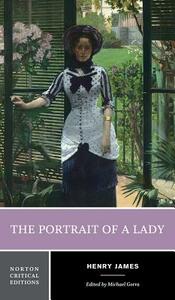Take a photo of a barcode or cover
challenging
emotional
reflective
slow-paced
Plot or Character Driven:
Character
Strong character development:
Yes
Loveable characters:
N/A
Diverse cast of characters:
No
Flaws of characters a main focus:
Yes
I'm rating books solely on how happy I am to have read them, lol
First of all, I want to say, that while Portrait is a very long book that many people would consider tedious, it does have it's merits. The characters are well-formed and I generally enjoyed reading it, but the ending is SO disappointing. I think that this book took a realistic course as far as the plot went, but I just think that the romantic in me was hoping for a little more.
2020 Book 14
I've been reading Henry James's novels in order, which has allowed me to see his steady growth as an author. Washington Square felt like the culmination of his early work, with its increasing sophistication within established genre boundaries of tragicomedy and melodrama, but this was something on a whole other level. The psychological density of this novel is shocking for the late 1800s, not only in unpacking Isabel in ways sympathetic (its open admiration for her independent streak) and critical (how well James paints her as a woman who realizes too late she was never as clever as she and others thought her to be), but also for how easily it flits between characters and thoroughly delves into their inner psyches and contradictions. It has the horizontal breadth of Tolstoy and the z-axis depth of Dostoevsky. James started this novel with nothing but a basic image and crafted one of the most structurally precise books I've ever read. Especially impressive is the way in which he consistently introduces characters through Isabel's perspective, allows us to see them the way she does, then, much later, give us just enough of those characters away from Isabel that their true selves, even when not nefarious, come as a profound shock to her rosy views.
Chapter 42 is justly famous for how well it manages to completely spell out Isabel's realizations of the mistakes in judgment (of herself and others) that led to her predicament even as it never feels like an exposition dump, instead plunging headlong into the sorrow that tacitly emerged after the novel's significant time jump. But I'm equally fond of the way James parcels out that unease, the way the novel's first half feels so liberating and politely defiant and how at the moment of greatest bliss we skip ahead and realize almost immediately that something has gone amiss. Similarly, I loved a late chapter in which Madame Merle, introduced first as a charming kindred spirit and long ago revealed to be a calculating, spiteful villain, gets a moment to come clean, which she of course doesn't, instead letting the miasma of mutual understanding hang between her and Isabel even as her own regret finally breaks through her walls of ironic detachment and casual cruelty. In some ways it's as revelatory a moment as chapter 42, even though most of its power comes from neither person saying out loud what Isabel has discovered and what Merle can see written in her blanched face.
I've been reading Henry James's novels in order, which has allowed me to see his steady growth as an author. Washington Square felt like the culmination of his early work, with its increasing sophistication within established genre boundaries of tragicomedy and melodrama, but this was something on a whole other level. The psychological density of this novel is shocking for the late 1800s, not only in unpacking Isabel in ways sympathetic (its open admiration for her independent streak) and critical (how well James paints her as a woman who realizes too late she was never as clever as she and others thought her to be), but also for how easily it flits between characters and thoroughly delves into their inner psyches and contradictions. It has the horizontal breadth of Tolstoy and the z-axis depth of Dostoevsky. James started this novel with nothing but a basic image and crafted one of the most structurally precise books I've ever read. Especially impressive is the way in which he consistently introduces characters through Isabel's perspective, allows us to see them the way she does, then, much later, give us just enough of those characters away from Isabel that their true selves, even when not nefarious, come as a profound shock to her rosy views.
Chapter 42 is justly famous for how well it manages to completely spell out Isabel's realizations of the mistakes in judgment (of herself and others) that led to her predicament even as it never feels like an exposition dump, instead plunging headlong into the sorrow that tacitly emerged after the novel's significant time jump. But I'm equally fond of the way James parcels out that unease, the way the novel's first half feels so liberating and politely defiant and how at the moment of greatest bliss we skip ahead and realize almost immediately that something has gone amiss. Similarly, I loved a late chapter in which Madame Merle, introduced first as a charming kindred spirit and long ago revealed to be a calculating, spiteful villain, gets a moment to come clean, which she of course doesn't, instead letting the miasma of mutual understanding hang between her and Isabel even as her own regret finally breaks through her walls of ironic detachment and casual cruelty. In some ways it's as revelatory a moment as chapter 42, even though most of its power comes from neither person saying out loud what Isabel has discovered and what Merle can see written in her blanched face.
Well…some excellent, excellent places. Some pieces of prose made me laugh. Love Ralph! Love Lord Warburton. Caspar Goodwood? Gosh … the ending.
J’ai l’impression que ça fait à peu près deux mois & demi que je lis ce livre. En vérité ça doit plus s’approcher des trois semaines, mais je crois que ça reflète bien l’effet que ce roman a eu sur moi – en le lisant, en m’y plongeant, j’ai eu la sensation d’entrer dans une histoire où le temps est gluant, lourd, où on s’y embourbe. Les pieds qui s’enfoncent dans de la glaise, de la bonne glaise épaisse dont on s’extirpe avec effort, en ayant peur d’y laisser ses souliers. Ce genre de sensation.
Bon. Je vais arrêter mes métaphores douteuses & passer tout de suite aux choses sérieuses : faut pas lire ce livre en pensant y trouver une série bien ficelée de rebondissements. L’action du roman est comme, je sais pas, diluée dans un véritable océan de mots : il y a bien une intrigue, on va de révélation en révélation, mais notre ami Henry a manifestement décidé que les raccourcis, ou même la concision, très peu pour lui. Alors on vogue. On vogue sur les pensées des personnages, on s’y perd parfois, on revient à l’intrigue principale – puis ça recommence. Un rythme lent qui m’a bercée, la plupart du temps. & qui m’a quand même un peu donné le goût de pitcher le livre par la fenêtre, à certains moments.
Ça, mettons que c’est pour la forme. Pour le fond : The Portrait of a Lady, c’est surtout l’histoire d’Isabel Archer, une jeune Américaine qui, dans la deuxième moitié du XIXe siècle, se retrouve en Angleterre. Elle demeure chez un oncle très riche, dans un manoir anglais tout ce qu’il y a de plus confortable, & son séjour là-bas bouleversera sa vie. Sans vouloir en dire trop (parce que ce roman est tellement lent que, juste avec les deux phrases précédentes, on s’approche probablement de la page deux cent quinze), Isabel verra ses ambitions tout d’abord exaucées, tentera d’aller au bout de ses grands rêves de liberté & d’indépendance, de sa passion & de sa curiosité pour le monde, mais se heurtera à d’immenses déceptions. Ça semble mince, comme intrigue, & peut-être que ce l’est. C’est la vie qui coule, ce sont les erreurs de jugement qui s’accumulent, ce sont les petites failles qui se creusent dans l’intimité que les personnages partagent avec d’autres. & à travers cette histoire de mauvais mariages & de prisons dorées, de pièges subtils, James semble vouloir nous parler de la vie comme elle est, parfois : inutilement compliquée, parsemée de malentendus. Pas futile, mais pas loin. Triste.
Pas exactement une lecture réjouissante, donc, mais j’y ai quand même trouvé des choses à aimer, & à aimer beaucoup. L’énergie d’Isabel au début du récit, l’intensité de sa douleur & de ses regrets dans la deuxième moitié de l’histoire, cette atmosphère d’intrigues & de manigances qui se tisse peu à peu autour d’elle ; la complexité de certains personnages, y compris Isabel, dont je ne sais toujours pas quoi penser, dont je ne saurais toujours pas dire si j’ai pour eux de la sympathie ou de la pitié ou du mépris. Ce que j’ai moins aimé, ce sont les choses qu’on peut reprocher à un écrivain du XIXe : des personnages féminins particulièrement bidimensionnels, une misogynie un peu trop lourde, des dialogues parfois tellement artificiels qu’ils en deviennent involontairement drôles, un style un peu ampoulé. & la lenteur, toujours la lenteur.
Mais peut-être que l’été est propice à la lenteur, je sais pas ; peut-être que c’est la saison où je la tolère le mieux. Reste que j’ai été happée par ce roman & j’ai toujours eu envie de m’y replonger, même si j’ai parfois eu l’impression de m’être irrémédiablement engluée dedans.
Bon. Je vais arrêter mes métaphores douteuses & passer tout de suite aux choses sérieuses : faut pas lire ce livre en pensant y trouver une série bien ficelée de rebondissements. L’action du roman est comme, je sais pas, diluée dans un véritable océan de mots : il y a bien une intrigue, on va de révélation en révélation, mais notre ami Henry a manifestement décidé que les raccourcis, ou même la concision, très peu pour lui. Alors on vogue. On vogue sur les pensées des personnages, on s’y perd parfois, on revient à l’intrigue principale – puis ça recommence. Un rythme lent qui m’a bercée, la plupart du temps. & qui m’a quand même un peu donné le goût de pitcher le livre par la fenêtre, à certains moments.
Ça, mettons que c’est pour la forme. Pour le fond : The Portrait of a Lady, c’est surtout l’histoire d’Isabel Archer, une jeune Américaine qui, dans la deuxième moitié du XIXe siècle, se retrouve en Angleterre. Elle demeure chez un oncle très riche, dans un manoir anglais tout ce qu’il y a de plus confortable, & son séjour là-bas bouleversera sa vie. Sans vouloir en dire trop (parce que ce roman est tellement lent que, juste avec les deux phrases précédentes, on s’approche probablement de la page deux cent quinze), Isabel verra ses ambitions tout d’abord exaucées, tentera d’aller au bout de ses grands rêves de liberté & d’indépendance, de sa passion & de sa curiosité pour le monde, mais se heurtera à d’immenses déceptions. Ça semble mince, comme intrigue, & peut-être que ce l’est. C’est la vie qui coule, ce sont les erreurs de jugement qui s’accumulent, ce sont les petites failles qui se creusent dans l’intimité que les personnages partagent avec d’autres. & à travers cette histoire de mauvais mariages & de prisons dorées, de pièges subtils, James semble vouloir nous parler de la vie comme elle est, parfois : inutilement compliquée, parsemée de malentendus. Pas futile, mais pas loin. Triste.
Pas exactement une lecture réjouissante, donc, mais j’y ai quand même trouvé des choses à aimer, & à aimer beaucoup. L’énergie d’Isabel au début du récit, l’intensité de sa douleur & de ses regrets dans la deuxième moitié de l’histoire, cette atmosphère d’intrigues & de manigances qui se tisse peu à peu autour d’elle ; la complexité de certains personnages, y compris Isabel, dont je ne sais toujours pas quoi penser, dont je ne saurais toujours pas dire si j’ai pour eux de la sympathie ou de la pitié ou du mépris. Ce que j’ai moins aimé, ce sont les choses qu’on peut reprocher à un écrivain du XIXe : des personnages féminins particulièrement bidimensionnels, une misogynie un peu trop lourde, des dialogues parfois tellement artificiels qu’ils en deviennent involontairement drôles, un style un peu ampoulé. & la lenteur, toujours la lenteur.
Mais peut-être que l’été est propice à la lenteur, je sais pas ; peut-être que c’est la saison où je la tolère le mieux. Reste que j’ai été happée par ce roman & j’ai toujours eu envie de m’y replonger, même si j’ai parfois eu l’impression de m’être irrémédiablement engluée dedans.
This very much felt like the author wrote it with a gilded paintbrush just to be posh but I acknowledge there is a complex psychology to it that I enjoyed
dark
sad
slow-paced
Plot or Character Driven:
Character
Strong character development:
Complicated
Loveable characters:
No
Diverse cast of characters:
No
Flaws of characters a main focus:
Yes
the overwhelming feeling i have right now is relief to finally be finished with this book.
i've read some long books before, but none have felt quite as arduous as this.
for the most part, i found thr characters pretty hard to stomach. the villains like madame merle and osmond are horrible, but so are isabel's friends who we're supposed to like. henrietta stackpole is a truly nasty person and bed friend to isabel until the last three or four chapters when she suddenly she's wonderful? all the suitors were annoying and just made me feel bad for isabel. caspar goodwood stalked her across the globe for over five years and eventually wore her down into not refusing him, and that's supposed to be a happy ending??
all that being said, i did love isabel. i thought her character was crafted brilliantly; all the painful changes she goes through feel so real, and it hurts to see the difference between her at the start of the book and the end.
i really did enjoy the first hundred pages or so, and the last hundred pages too. it's just the middle section that drags on and makes the whole thing painful.
i've read some long books before, but none have felt quite as arduous as this.
for the most part, i found thr characters pretty hard to stomach. the villains like madame merle and osmond are horrible, but so are isabel's friends who we're supposed to like. henrietta stackpole is a truly nasty person and bed friend to isabel until the last three or four chapters when she suddenly she's wonderful? all the suitors were annoying and just made me feel bad for isabel. caspar goodwood stalked her across the globe for over five years and eventually wore her down into not refusing him, and that's supposed to be a happy ending??
all that being said, i did love isabel. i thought her character was crafted brilliantly; all the painful changes she goes through feel so real, and it hurts to see the difference between her at the start of the book and the end.
i really did enjoy the first hundred pages or so, and the last hundred pages too. it's just the middle section that drags on and makes the whole thing painful.
reflective
sad
slow-paced
I have slogged my way through this long, slow trainwreck of a book, and by the end - like most observers of trainwrecks - I was fascinated. That fascination, I admit, was some time coming. I enjoyed the first half of the book, but it wasn't until Isabel was actually married to her awful husband that it really started to come together for me. And - fascination or not - I am torn in my reaction to it... or at least to Isabel, and that's essentially the same thing. I want to have sympathy for her, because she's fundamentally a tragic figure who has let her illusions ruin her life, but my perception of her, by the end, is less a person and more an aesthetic: a beautiful image of delicate misery. One might as well feel sorry for a cloud. Except that's not quite true and not quite fair, because that wanting-to-have-sympathy is undermined by my rather fatalistic opinion that she's going back to her husband and a life not much changed. I don't know if it's that she lacks gumption or that she has it in spades and directs it all to prolonging her own unhappiness.
All I do know, by the end, is that I much prefer Henrietta Stackpole and I think she's bound to have a much happier life. And like Isabel, all by her own efforts.
Finally, this edition includes a preface written by James. It is absolutely glutinous. Pacing is clearly something that has passed him by entirely.
All I do know, by the end, is that I much prefer Henrietta Stackpole and I think she's bound to have a much happier life. And like Isabel, all by her own efforts.
Finally, this edition includes a preface written by James. It is absolutely glutinous. Pacing is clearly something that has passed him by entirely.
I enjoyed this novel much more with repeat reading. I remain mystified as ever at what motivates nearly all of the characters, but they are such strongly rendered, real and moving characters. It's a depressing story -- a bright young woman "ground in the mill of the conventional", then refusing to escape. But the writing is compelling and the small movements of private life -- the natural territory of the novel -- are painstakingly rendered.









